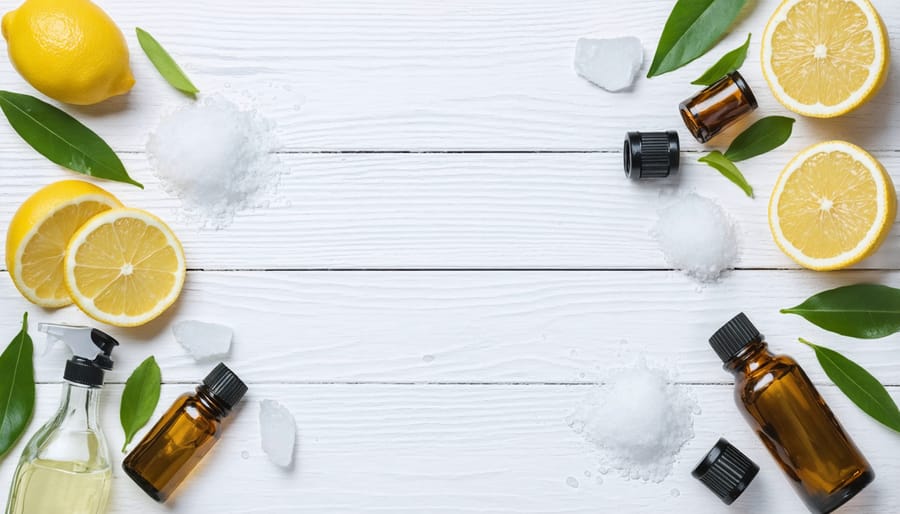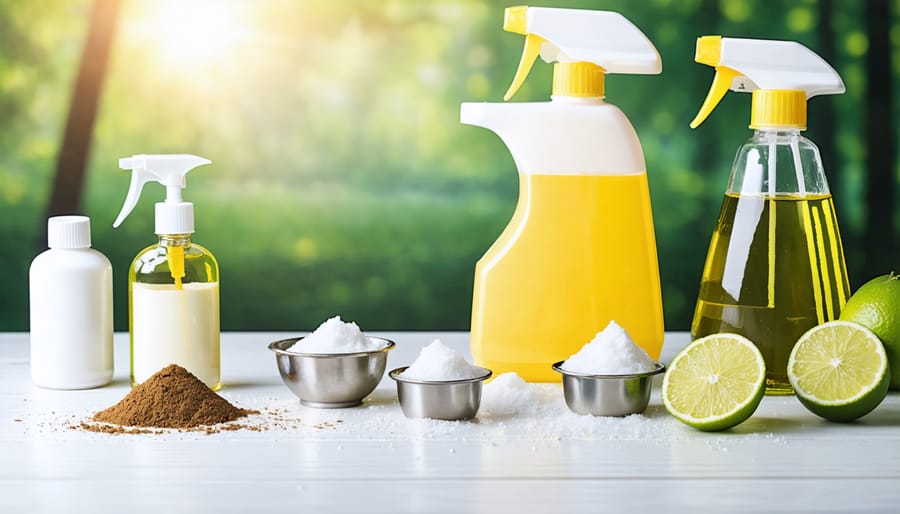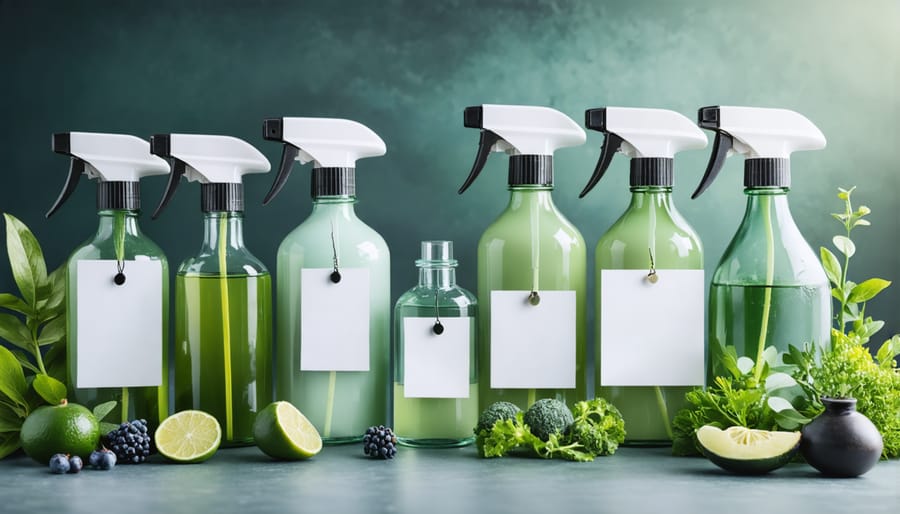Transform your cleaning routine with simple kitchen ingredients that outperform harsh chemicals. White vinegar, baking soda, and lemon juice create powerful expert-tested natural cleaning products right in your home. These affordable alternatives not only protect your family from toxic chemicals but also reduce plastic waste and save money.
Mix equal parts water and vinegar in a spray bottle for an all-purpose cleaner that eliminates 99% of surface bacteria. Sprinkle baking soda on tough stains, then spray with vinegar to create a natural scrubbing bubble effect that lifts grime effortlessly. For streak-free windows and mirrors, combine 2 cups of water with ¼ cup of white vinegar and 2 tablespoons of lemon juice.
These natural solutions work as effectively as commercial cleaners while being gentle enough for daily use around children and pets. They leave your home fresh and clean without the lingering chemical smell or harmful residue of traditional cleaners. Best of all, you’ll cut your cleaning supply costs by up to 75% while helping protect the environment.

Kitchen Cabinet Cleaning Heroes
Vinegar: The All-Purpose Champion
Vinegar isn’t just for salad dressing – it’s a powerhouse cleaner that’s been trusted for generations. This humble kitchen staple contains acetic acid, which naturally breaks down grease, dissolves mineral deposits, and kills many types of bacteria. Best of all, it’s incredibly affordable and environmentally friendly.
White vinegar works wonders in bathrooms, tackling soap scum and hard water stains with ease. Mix equal parts vinegar and water in a spray bottle for an all-purpose cleaner that’s perfect for countertops, windows, and mirrors. For tough jobs, use it full strength on toilet bowls or shower heads to dissolve stubborn calcium buildup.
In the kitchen, vinegar cuts through grease on stovetops and eliminates odors from cutting boards. It’s also excellent for cleaning coffee makers – just run a cycle with equal parts vinegar and water to remove mineral deposits and improve your brew’s taste.
Pro tip: Add a few drops of your favorite essential oil to mask vinegar’s strong scent. Lemon, lavender, or tea tree oil work beautifully while adding their own cleaning properties to the mix.
Baking Soda’s Secret Powers
Baking soda is truly a cleaning powerhouse that’s been trusted by generations of homemakers, and for good reason. This humble powder’s natural abrasiveness makes it perfect for tackling tough stains and grime without scratching delicate surfaces. Its alkaline nature helps it break down grease and oil effectively, while also neutralizing acidic odors that lurk in your home.
For stubborn bathroom stains, create a paste by mixing baking soda with just enough water to form a thick consistency. Let it sit for 10-15 minutes before scrubbing – you’ll be amazed at how easily soap scum and mineral deposits disappear. In the kitchen, sprinkle it directly on grease stains or burnt food residue, then wipe with a damp cloth for effortless cleaning.
What makes baking soda particularly impressive is its versatility. From deodorizing carpets and upholstery to cleaning silver and removing coffee stains from mugs, this natural cleaner can handle it all. Plus, it’s gentle enough to use on most surfaces without worry about harmful chemical residues. For extra cleaning power, combine it with white vinegar to create a naturally fizzing solution that cuts through the toughest grime.
Lemon: Nature’s Brightener
Lemons are truly nature’s cleaning powerhouse, packed with citric acid that cuts through grease and naturally antibacterial properties that fight germs. The fruit’s bright, fresh scent also makes it an excellent natural deodorizer for your home. Simply slice a lemon in half and sprinkle some salt on the cut side to create an effective scrubber for wooden cutting boards and countertops. For stubborn stains on white surfaces, apply lemon juice directly and let the sun work its natural bleaching magic. You can even combine lemon juice with water in a spray bottle to create an all-purpose cleaner that’s perfect for kitchen surfaces and windows. As a bonus tip, run lemon peels through your garbage disposal to eliminate unpleasant odors and leave your kitchen smelling fresh and clean.
Tested Natural Cleaning Recipes
All-Purpose Surface Cleaner
Creating an effective all-purpose surface cleaner at home is simpler than you might think. This versatile solution works wonders on countertops, tables, appliances, and most hard surfaces while being gentle on both your wallet and the environment.
Mix 2 cups of white vinegar, 2 cups of water, 1 tablespoon of baking soda, and 20 drops of lemon, tea tree, or lavender essential oil in a spray bottle. The vinegar acts as a natural disinfectant, while baking soda provides gentle scrubbing power. Essential oils not only leave a pleasant scent but also contribute antimicrobial properties.
This natural cleaner effectively removes everyday dirt, grease, and grime without leaving harmful chemical residues. In our testing, it performed just as well as commercial cleaners on most household surfaces, though you might need to scrub a bit more on tough stains.
Pro tip: Always test on a small, hidden area first, especially on natural stone surfaces, as vinegar can damage marble and granite. For best results, shake the bottle gently before each use to remix the ingredients. Store in a cool, dark place and use within three months.

Bathroom Deep Clean Solution
For those tough bathroom challenges, this powerful natural cleaner combines the might of baking soda with the natural disinfecting properties of vinegar and tea tree oil. Mix 1 cup of baking soda with ¼ cup of white vinegar in a glass bowl – watch it fizz! Once the reaction settles, add 10 drops of tea tree oil and enough water to form a paste.
Apply this mixture to stubborn soap scum, tile grout, or bathroom surfaces using a scrub brush or sponge. Let it sit for 10-15 minutes to break down tough grime. For extra cleaning power on grout lines, use an old toothbrush to work the solution into the spaces between tiles.
The baking soda acts as a gentle abrasive while vinegar cuts through mineral deposits and soap scum. Tea tree oil’s natural antimicrobial properties help combat mold and mildew. This solution is particularly effective on shower doors, tub rings, and sink stains.
Pro tip: Make this cleaner fresh each time you use it to ensure maximum effectiveness. The fizzing action between baking soda and vinegar is most powerful when first combined.
Glass and Mirror Spray
Say goodbye to chemical-laden glass cleaners and hello to a natural solution that delivers amazing streak-free window cleaning results. This homemade spray combines the power of white vinegar with a few simple ingredients you probably already have in your kitchen.
Mix 2 cups of distilled water with ½ cup of white vinegar and ¼ cup of rubbing alcohol in a spray bottle. Add 1-2 drops of essential oil (lavender or lemon work great) to combat the vinegar smell. The alcohol helps the solution evaporate quickly, preventing streaks, while vinegar cuts through dirt and grime effectively.
For best results, spray the solution onto your glass or mirror surface and wipe with a lint-free microfiber cloth. Use newspaper instead of paper towels for extra sparkle – it’s an old-school trick that really works! Clean on a cool, cloudy day when possible, as direct sunlight can cause the solution to dry too quickly and leave streaks.
This natural solution is not only effective but costs just pennies per bottle to make, saving you money while protecting the environment from harsh chemicals.
Floor Cleaning Formula
Create an effective natural floor cleaner by combining 1 cup of white vinegar, 1 cup of rubbing alcohol, and 1 cup of warm water in a spray bottle. Add 2-3 drops of liquid dish soap and your favorite essential oil for a pleasant scent. This versatile solution works wonderfully on hardwood, tile, laminate, and vinyl flooring.
Before deep cleaning your floors, always test the solution in a small, inconspicuous area first. For best results, spray the mixture lightly on your floor and wipe with a microfiber mop. The vinegar cuts through dirt and grime, while the alcohol helps the solution dry quickly, preventing water damage to sensitive surfaces.
For tough spots, let the solution sit for a minute before wiping. This natural cleaner not only saves money but also eliminates harsh chemicals from your home. The formula is particularly effective at removing sticky residue and leaving floors streak-free. Plus, the antimicrobial properties of vinegar and alcohol help sanitize your floors naturally, making this an excellent choice for households with children and pets.
Essential Oil Boosters
Best Essential Oils for Cleaning
Essential oils aren’t just for aromatherapy – they pack a powerful punch when it comes to natural cleaning. Tea tree oil leads the pack with its impressive antibacterial and antifungal properties, making it perfect for tackling bathroom mold and kitchen counters. Lemon essential oil cuts through grease while leaving a fresh, clean scent that most people associate with cleanliness.
Lavender essential oil is another multipurpose powerhouse, combining natural antibacterial properties with a calming scent that’s perfect for bedroom and living space cleaning. For tough jobs, eucalyptus oil works wonders on sticky residues and stubborn grime, while peppermint essential oil helps deter pests while providing antimicrobial benefits.
When using essential oils for cleaning, always dilute them properly – typically 10-15 drops per cup of water or cleaning solution. Consider mixing complementary scents like lemon and lavender, or tea tree and eucalyptus, to create your signature cleaning blend. Remember that these oils are highly concentrated, so a little goes a long way in your cleaning routine.
Pro tip: Store your essential oil cleaning solutions in dark glass bottles to preserve their effectiveness, and always label them clearly with the contents and date mixed.
Custom Scent Combinations
Transform your natural cleaners into delightful sensory experiences with these carefully curated essential oil combinations. For kitchens, try mixing lemon, lime, and sweet orange oils for a bright, energizing blend that cuts through grease while uplifting your mood. In bathrooms, combine tea tree, eucalyptus, and lavender for a fresh, clean scent with added antimicrobial benefits.
Create a calming atmosphere in bedrooms with a blend of lavender, chamomile, and vanilla. For living spaces, try combining wild orange, cinnamon, and clove for a warm, welcoming aroma that naturally purifies the air. When cleaning your home office, boost focus with a refreshing mix of peppermint, rosemary, and lemon.
For general cleaning throughout your home, try these popular combinations:
– Clean & Fresh: lavender + lemon + peppermint
– Cozy Home: cinnamon + clove + orange
– Spring Clean: lemon + lime + grapefruit
– Forest Fresh: pine + cedarwood + eucalyptus
Remember to start with just a few drops of each oil and adjust according to your preferences. Always test new combinations in small amounts first to ensure you enjoy the scent.
Safe Storage and Usage Tips
Container Selection and Storage
Proper storage of your natural cleaning solutions is crucial for maintaining their effectiveness and ensuring safety. Always opt for dark-colored glass bottles or high-quality plastic containers labeled HDPE (High-Density Polyethylene) when storing your homemade cleaners. Dark glass helps protect light-sensitive ingredients like essential oils from degradation, while HDPE plastic resists chemical reactions with cleaning agents.
Label each container clearly with the contents, date of preparation, and intended use. A simple masking tape and permanent marker work perfectly for this purpose. Remember to include a list of ingredients on the label – this is especially important if you have children or pets in your home.
Store your natural cleaners in a cool, dry place away from direct sunlight. Most solutions will keep well in a kitchen cabinet or cleaning closet. For vinegar-based cleaners, ensure proper ventilation to prevent odors from spreading. Keep all cleaning solutions, even natural ones, out of reach of children and pets.
When it comes to shelf life, most natural cleaners remain effective for 3-6 months when properly stored. Solutions containing fresh ingredients like citrus peels should be used within 2-3 weeks. Always perform a sniff test before use – if something smells off or you notice any unusual changes in color or consistency, it’s best to make a fresh batch.

Shelf Life and Safety Precautions
While natural cleaners are generally safer than harsh chemicals, it’s important to understand their shelf life and proper handling. Most homemade cleaning solutions last between 2-4 weeks when stored properly. To maximize longevity, keep your natural cleaners in dark glass bottles or opaque containers away from direct sunlight and heat.
For vinegar-based cleaners, expect them to remain effective for about a month. Citrus-infused solutions should be used within two weeks to prevent mold growth. Essential oil blends typically maintain their potency for 3-4 weeks when properly diluted.
Always label your containers with the contents and date of preparation. Store them out of reach of children and pets, just as you would with commercial cleaners. While natural ingredients are gentler, some essential oils and vinegar can still cause irritation if mishandled.
Safety tips to remember:
– Never mix different natural cleaners without researching compatibility
– Test new solutions on a small, hidden area first
– Use gloves when handling concentrated solutions
– Keep cleaning solutions separate from food items
– Ensure proper ventilation when cleaning
– Dilute essential oils according to recommended ratios
If you notice any change in color, texture, or smell, it’s best to dispose of the cleaner and make a fresh batch. When in doubt, make smaller quantities more frequently rather than large batches that might expire before use.
Making the switch to natural green cleaners isn’t just a trend – it’s a smart choice for your home, health, and the environment. By using simple ingredients like vinegar, baking soda, and essential oils, you can effectively clean your home while avoiding harsh chemicals and reducing plastic waste. Not only will you save money on expensive cleaning products, but you’ll also create a safer environment for your family and pets. The best part? These natural solutions often work just as well as, if not better than, their commercial counterparts. Start small by trying one or two natural cleaning recipes, and gradually expand your eco-friendly cleaning routine. Your home – and the planet – will thank you for making this positive change. Remember, every small step toward sustainable living makes a difference, and natural cleaning is an excellent place to begin.
